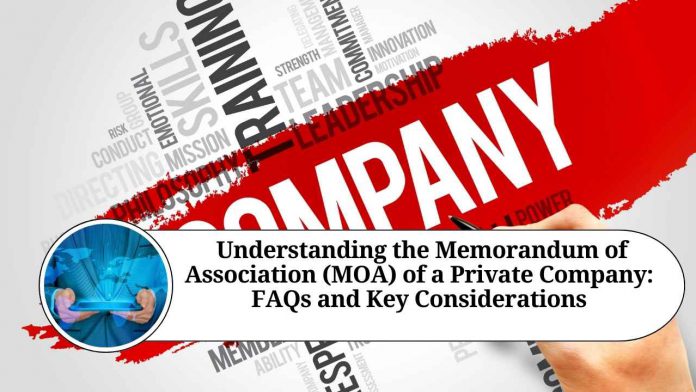What is the Memorandum of Association?
The Memorandum of Association is a legal document that defines a private company’s objectives, scope of activities, and powers. It is one of the company’s founding documents, along with the Articles of Association, and is submitted to the Registrar of Companies during the incorporation process.
What is the purpose of the Memorandum of Association?
The primary purpose of the Memorandum of Association is to provide clarity on the company’s objectives and scope of activities. It is a public document that sets out the company’s mission, vision, and activities it is authorized to undertake. The MOA helps to protect shareholders’ interests by ensuring that the company is not engaged in activities outside its defined scope.
What are the contents of the Memorandum of Association?
The MOA of a private company typically includes the following information:
a. Name Clause: This clause states the name of the company and confirms that the company is a private limited company.
b. Registered Office Clause: This clause confirms the company’s registered office location and is essential for determining the company’s jurisdiction and legal obligations.
c. Object Clause: This clause outlines the company’s primary objectives and activities. It defines the scope of activities in which the company can legally engage and sets the boundaries for the company’s operations.
d. Liability Clause: This clause defines the extent of liability of the company’s shareholders. In a private limited company, the shareholders’ liability is limited to the amount unpaid on their shares.
e. Capital Clause: This clause outlines the authorized share capital of the company and the number of shares that the company can issue.
Why is the Memorandum of Association significant?
The MOA is a significant legal document that defines the scope of activities of the company and sets the limits of the company’s powers. It helps to protect shareholders’ interests by ensuring that the company cannot engage in activities outside its defined scope. It is also important for the company’s compliance with legal requirements, as the MOA must be submitted to the Registrar of Companies during the incorporation process.
Can the Memorandum of Association be amended?
Yes, the Memorandum of Association can be amended by the company’s shareholders through a special resolution. However, the amendment must be consistent with the Companies Act and must be approved by the Registrar of Companies. Any change to the MOA must be filed with the Registrar of Companies within 30 days of the resolution being passed.
What is the difference between the Memorandum of Association and the Articles of Association?
The Memorandum of Association and the Articles of Association are both founding documents of a company, but they serve different purposes. The MOA defines the company’s objectives, scope of activities, and powers, while the Articles of Association govern the internal management and operation of the company. The Articles of Association outline the company’s procedures for decision-making, appointing directors, issuing and transferring shares, and other matters related to the company’s operation.
What are the consequences of not having a Memorandum of Association?
A Memorandum of Association is a legal requirement for the incorporation of a company. Failure to have an MOA can result in the company being unable to incorporate and conduct business legally. Without an MOA, the company would not have defined objectives, powers, or scope of activities, which could lead to confusion and disputes between shareholders and directors.
Conclusion
the Memorandum of Association is a fundamental legal document that defines a private company’s objectives, scope of activities, and powers. It is a crucial document for the company’s compliance with legal requirements, protection of shareholders’ interests, and operation. The MOA can be amended by a special resolution, but any changes must be consistent with the Companies Act and approved by the Registrar of Companies.
Other Related Blogs: Section 144B Income Tax Act
Frequently Asked Questions (FAQs) about Memorandum of Association (MOA) of a Private Company:
Q.What is the purpose of the Memorandum of Association (MOA) of a private company?
The primary purpose of the MOA is to define a private company’s objectives, scope of activities, and powers. It is a legal document that sets out the company’s mission and vision, and the activities it is authorized to undertake.
Q.What is included in the MOA of a private company?
The MOA of a private company typically includes clauses such as the name clause, registered office clause, object clause, liability clause, and capital clause. These clauses define the company’s name, registered office location, objectives and activities, extent of shareholder liability, and authorized share capital.
Q.Can the MOA be amended after incorporation?
Yes, the MOA can be amended by the company’s shareholders through a special resolution. However, any changes must be consistent with the Companies Act and must be approved by the Registrar of Companies.
Q.What is the difference between the MOA and the Articles of Association (AOA)?
The MOA defines the company’s objectives, scope of activities, and powers, while the AOA governs the internal management and operation of the company. The AOA outlines the company’s procedures for decision-making, appointing directors, issuing and transferring shares, and other matters related to the company’s operation.
Q.Is the MOA a legal requirement for a private company?
Yes, the MOA is a legal requirement for the incorporation of a private company. Without an MOA, the company would not have defined objectives, powers, or scope of activities, which could lead to confusion and disputes between shareholders and directors.
Q.Is the MOA a public document?
Yes, the MOA is a public document and must be submitted to the Registrar of Companies during the incorporation process. It is available for inspection by any member of the public upon request.
Q.What are the consequences of not having an MOA?
Failure to have an MOA can result in the company being unable to incorporate and conduct business legally. Without an MOA, the company would not have defined objectives, powers, or scope of activities, which could lead to confusion and disputes between shareholders and directors.




















